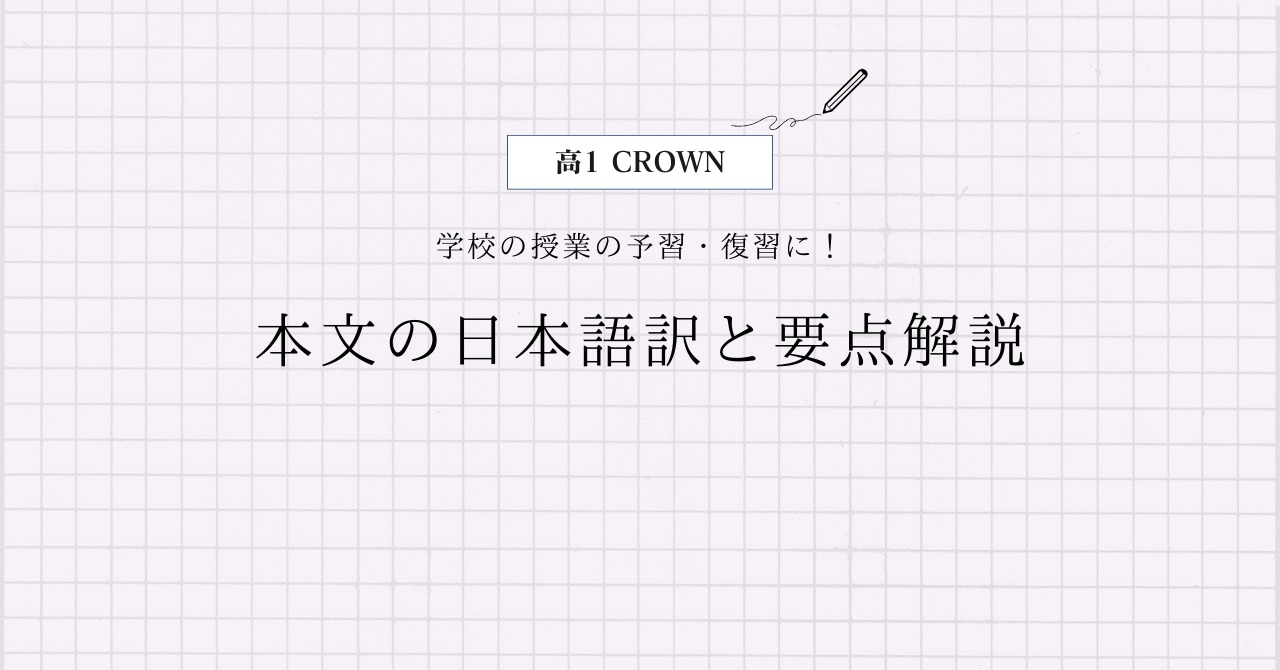三省堂 高1CROWN English Communication1 Lesson3 Section3の本文の日本語訳と重要箇所の解説です。
Section3-1, 3-2, 3-4の解説はこちらからご覧ください。
>高1CROWN English Communication1 Lesson3 Section1 本文和訳
>高1CROWN English Communication1 Lesson3 Section2 本文和訳
>高1CROWN English Communication1 Lesson3 Section4 本文和訳
- CROWN English Communication1 Lesson3 Section3 本文と日本語訳
- CROWN English Communication1 Lesson3 Section3 重要事項の解説
- In 2011, after the Great East Japan Earthquake, I joined a volunteer group in Sendai.
- Because schools were closed, children had nothing to do.
- They looked bored.
- I thought my painting project might cheer them up.
- I started working with these children.
- A barber in Ofunato, Iwate, asked me to paint a sign for his shop.
- I not only made the sign, but I also painted his whole shop in bright colors!
- I had doubts about the usefulness of my art project, but I did not want to think that art has no power in the face of disaster.
- Money and supplies that people donate can be of great help.
- But working together on a painting and sharing the joy of creation can also help.
- People can laugh and smile even in the worst conditions.
- In 2017, I found myself in Mariupol, Ukraine.
- A war was going on.
- People were dying every day.
- I saw shell holes everywhere and buildings destroyed by bombs.
- CROWN English Communication1 Lesson3 Section3 まとめ
CROWN English Communication1 Lesson3 Section3 本文と日本語訳
In 2011, after the Great East Japan Earthquake, I joined a volunteer group in Sendai.
「2011年の東日本大震災の後,私は仙台のボランティア団体に参加しました。」
Because schools were closed, children had nothing to do.
「学校は閉鎖されていたので,子どもたちはすることがありませんでした。」
They looked bored.
「彼らは退屈そうでした。」
I thought my painting project might cheer them up.
「私は,絵を描くプロジェクトは彼らを元気づけるかもしれないと思いました。」
I started working with these children.
「私はこの子どもたちと作業し始めました。」
We painted the walls of a school.
「私たちは学校の壁に絵を描きました。」
A barber in Ofunato, Iwate, asked me to paint a sign for his shop.
「岩手県大船渡市の理髪店が,私にお店の看板を描いてくれないかと頼んできました。」
I not only made the sign, but I also painted his whole shop in bright colors!
「私は看板を作るだけでなく,彼の店全体を明るい色に塗りました!」
I had doubts about the usefulness of my art project, but I did not want to think that art has no power in the face of disaster.
「私は自分のアートプロジェクトの有用性に疑いを持っていましたが,災害に直面したとき,芸術には力がないと思いたくなかったのです。」
Money and supplies that people donate can be of great help.
「人々が寄付するお金と物資は大きな助けになります。」
But working together on a painting and sharing the joy of creation can also help.
「しかし一緒に絵を描くことに取り組み,創造の喜びを共有することもまた役立ちます。」
People can laugh and smile even in the worst conditions.
「人々は最悪の状況下でさえ笑い,笑顔になることができます。」
In 2017, I found myself in Mariupol, Ukraine.
「2017年,気付くと私はウクライナのマウリポリにいました。」
A war was going on.
「戦争が続いていました。」
It was a very dangerous place.
「とても危険な場所でした。」
People were dying every day.
「人々が毎日死んでいました。」
I saw shell holes everywhere and buildings destroyed by bombs.
「私はいたるところにある砲弾による穴と,爆弾によって破壊された建物を見ました。」

CROWN English Communication1 Lesson3 Section3 重要事項の解説
In 2011, after the Great East Japan Earthquake, I joined a volunteer group in Sendai.
“after”は「~の後で」という前置詞です。
“the Great East Japan Earthquake“は「東日本大震災」のことです。
“join”は「に参加する」という動詞ですね。
Because schools were closed, children had nothing to do.
この文では「接続詞because」が使われていますね。
“close”は「を閉める,閉鎖する」という動詞で,ここでは「受動態」になっています。
“nothing”は「何もない」という代名詞で,“to do”は「不定詞の形容詞的用法」となり“nothing”を修飾しています。
They looked bored.
“They”は“children”を指していますね。
“look 形容詞”は「~に見える」という重要表現です。
“bored”は「退屈な」という形容詞になります。
I thought my painting project might cheer them up.
“thought”の後ろには「接続詞that」が省略されていますね。
“project”は「企画,計画,プロジェクト」という名詞です。
“might”は「~かもしれない」という助動詞で,本来は“may”の過去形になりますが,現在形としても使うことができます。その場合は“may”よりも低い可能性を示します。
“cheer up”は「を元気づける,励ます」という表現で,今回のように目的語が代名詞なら”cheer”と”up”の間に,それ以外のときは間か”up”の後ろのどちらにも目的語を置けます。
I started working with these children.
“working”は「動名詞」になっていますね。
“these”は“this”の複数形で,「これらは(の)」といった意味になります。
A barber in Ofunato, Iwate, asked me to paint a sign for his shop.
“barber”は「理髪店,床屋」,“sign”は「看板,しるし,サイン」という名詞になります。
“ask 人 to 動詞の原形”で「人に~するよう頼む」という重要表現です。
I not only made the sign, but I also painted his whole shop in bright colors!
“not only A but also B”は「AだけでなくBも」という重要表現です。
“whole”は「全体の」,“bright”は「明るい,眩しい」という形容詞です。
I had doubts about the usefulness of my art project, but I did not want to think that art has no power in the face of disaster.
“doubt”は「疑い,疑問」,“usefulness”は「有用性」,“power”は「力,権力」,“disaster”は「災害」という名詞です。
“of”は前置詞で,”A of B”の形で「BのA」というように後ろから前に訳します。
“want to 動詞の原形”で「~したい」という重要表現です!「不定詞の名詞的用法」と一緒に確認しておきましょう。
また,“think”の後ろには「接続詞that」が使われていますね。
“in the face of~”は「~に直面して」という表現になります。
Money and supplies that people donate can be of great help.
“supply”は「供給,物資」といった名詞です。
“that”は「目的格の関係代名詞」で,“that people donate”が先行詞“Money and supplies”を修飾しています。
“donate”は「を寄付する」という動詞になります。
“be of great help”は「大きな助けになる」という表現です。
But working together on a painting and sharing the joy of creation can also help.
“work on~”で「~に取り組む」という意味で,“working”と“painting”,“sharing”は「動名詞」になっていますね。
“share”は「を共有する」という動詞で,“joy”は「喜び」,“creation”は「創造」という名詞になります。
People can laugh and smile even in the worst conditions.
“laugh”は「笑う」,“smile”は「笑顔になる」という動詞です。
“even”は「~でさえ」という強調を表す副詞ですね。
“worst”は“bad”の「最上級」で,“condition”は「状況」という名詞ですね。
In 2017, I found myself in Mariupol, Ukraine.
“find oneself”は「自分が~だと分かる,気が付くと~している」という意味になります。
A war was going on.
“war”は「戦争」という名詞です。
“go on”は「続く」という表現で,ここでは「過去進行形」になっていますね。
People were dying every day.
“die”は「死ぬ」という動詞で,ここでは「過去進行形」になっていますね。
“die”や”lie(横になる)”といった”-ie”で終わる動詞の進行形は,”ie”を”y”にかえて”ing”を付けます。
I saw shell holes everywhere and buildings destroyed by bombs.
“shell hole”は「砲弾による穴」,“building”は「建物」,“bomb”は「爆弾」という名詞です。
“everywhere”は「いたるところで」という副詞ですね。
“destroy”は「を破壊する」という動詞で,ここでは「過去分詞」として“destroyed by bombs”が“buildings”を修飾しています。
CROWN English Communication1 Lesson3 Section3 まとめ
以上がCROWN English Communication1 Lesson3 Section3の日本語訳となります。
「分詞」や「関係代名詞」の使い方をしっかり確認しておきましょう!
>高1CROWN English Communication1 Lesson3 Section1 本文和訳
>高1CROWN English Communication1 Lesson3 Section2 本文和訳
>高1CROWN English Communication1 Lesson3 Section4 本文和訳
何か分からない点や他に解説してほしい点があれば,お気軽にコメントしてください!



コメント